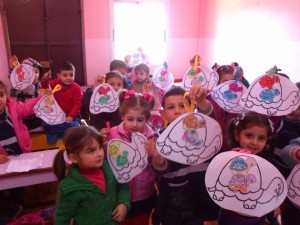Night School in Latakia Stadium: A Rare Success Story

Raheel Ibrahim
The Latakia sports stadium has been transformed into a bustling tent city, as some 2,500 internally displaced Syrians taking refuge there struggle to eke out a living and rebuild a sense of normalcy for themselves and their families.
Mohammad has turned his tent into a makeshift barber shop, while his neighbour, Ahmed, advertises telephone recharge cards on his. Others prefer to search for work outside the stadium walls, and even in the surrounding countryside.
The presence of so many families, most of them from Aleppo, soon raised concerns about the welfare and education of the displaced children. And so, last fall, the Red Crescent together with a number of local organizations banded together to open a school inside the stadium. Over 60 volunteers currently work on the initiative as administrators and teachers, serving about 1,000 students.

The first meeting between the volunteers and the children was out in the open; they had no sponsors, so they spread out of the ground before the stadium administrators finally opened one of the unused halls. Thus, the night school was formed and opened on September 30, 2012. The school now offers classes to students ranging in age from kindergarten to elementary school, as well as courses in French, art, and literacy classed for adults.
“I did not know how to write a single letter,” Amina, who is in her 40’s, told The Damascus Bureau. “Today I am at the top of my class.”
Maryam (not her real name), one of the project supervisors, said the idea of building a school gained momentum following the success of several other educational activities directed towards children.
“With the influx of displaced families into the city of Latakia, the children’s library public organised several activities for children with the Latakia News Network,” she said, referring to a local media network that is active on Facebook and includes online radio. “The activities included a mobile library in addition to … reading circles and movies for children.”
Sarah (not her real name), another team supervisor, explained that the presence of the school inside the stadium was in response to the special needs of displaced families.
“Forced displacement … and the constant fear of death have a negative effect on the psychological condition of the parents, so they refuse to send their children outside the stadium to pursue education,” she said.
In addition to the psychological trauma of displacement, other volunteers suggested that many families who may not support the government view the volunteers from Latakia with suspicion because the city is seen as a bastion of the regime.
“We often hear rumours that most of the people only pretend to have a good relationship with us,” said Samir (not his real name), one of the volunteer teachers. “We do not ask them about anything unrelated to the school schedule and curriculum.”
Communication between students and teachers has improved over time. Teenagers in particular appear to be benefitting from their relationships with their teachers, who represent trusted authority figures outside their family with whom they can discuss sensitive topics.
“A kind of friendship has grown between us and the teachers,” said Amira, an elementary school student. “One of the first topics we discussed when we entered the school, which is mixed, was relationships between young men and women.”
Samir also speaks highly of the special relationship between the teachers and the younger children, whom he described as a “source of joy” at the school.
“When we get to school every evening, we find children waiting for our bus, and as soon as we arrive they begin chanting our names,” he added.
After a while, parents began to ask whether the education received by their sons and daughters at the school was officially recognized. Sarah said the school encountered several obstacles before finally gaining recognition from the Ministry of Education.
“Before we launched the school, a delegation from the Directorate of Education visited the site at our request, and promised to cooperate,” she said, adding, however, that these promises did not translate into action on the ground.
In the end, the volunteers’ work was finally recognized by the Ministry of Education after the project received extensive local media coverage. The ministry has since sent representatives to register the names of students and their personal data so that their work can be officially recognized.
Sarah attributes this positive step to “the administrative staff’s insistence on carrying on, despite the difficulties, and the families’ trust, which has grown since the project began.”
